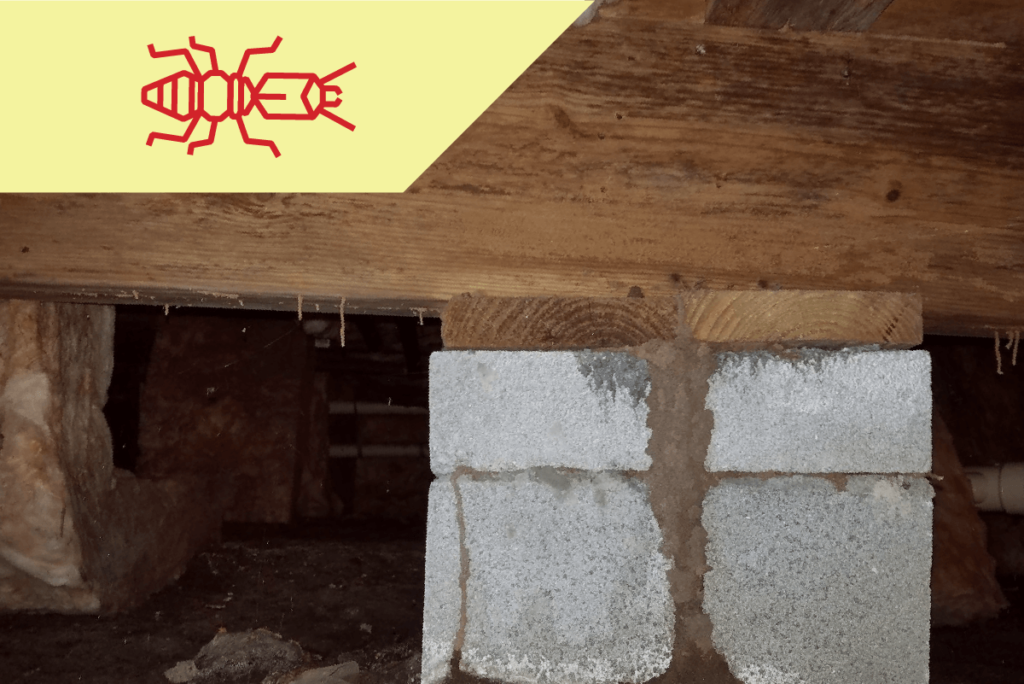If you are in the process of buying a house—congratulations! Whether this is your very first home or you are simply relocating, buying a home is an exciting process. What’s less exciting, however, is moving into your new home and discovering that it has structural damage caused by termites and or other wood-destroying insects like carpenter ants. Unfortunately for homeowners, termite damage is rarely covered by insurance, but if you spot signs of termite activity in your prospective property, you can request reparations and termite treatments.

How Termites Can Damage a Home
Termites eat the cellulose found in wood and can cause more than $5 billion in property damage each year. As they search for food, termites will chew through wood, flooring, and even wallpaper. This kind of termite activity can significantly damage a house’s foundation and structural support, costing thousands to fix. Several termite colonies can also live together on one acre of land—meaning millions of termites could have access to your home at any time. In the United States, subterranean termites and drywood termites are the most common species, and both can create significant stress on your home.
The areas of a home that are most vulnerable to termite damage are slab foundations, areas where wood touches dirt, and inaccessible crawl spaces. These spots are prone to excess moisture and can be attractive to termites.
The repairs from termite damage can cost thousands of dollars, depending upon how much wood they have eaten, how long the colony has existed in the home, and where the damaged wood is located in the house.

Getting a Termite Inspection Before Buying Your Home
Before you move into your new home, it’s important to have a home inspector perform a termite inspection so you avoid any unforeseen costs or damages. Termite damage is not always visible to the naked eye but trained termite experts will know how what to look for. Even if you weren’t already planning on scheduling a termite inspection, you may not have a choice depending on how you plan to purchase your home. A termite inspection is often required in order to complete a real estate transaction, and some mortgages, such as FHA and VA loans, could be conditional depending on the amount of repairs needed.
Fortunately, these inspections are relatively affordable, especially in contrast to the thousands of dollars in damage you may incur if you don’t check for termites before closing.
What to Expect from a Termite Inspection
A termite inspection is different from a standard home inspection in that the termite inspector assesses the condition of the physical structure of a home, from the roof to the foundation. Termite inspections, when performed by a professional, typically last about an hour. The inspection process is relatively hands-off for the homeowner and prospective buyer.
During the inspection, a termite specialist will inspect and probe the home from the attic to the basement for signs of termite damage. Your inspector will focus on areas most prone to wood damage caused by termites, including window sills, baseboards, door frames, and wood flooring. Evidence of termite damage can include:
- Buckling wood
- Swollen floors and ceilings
- Areas that appear to be affected by slight water damage
- Visible mazes or shelving within walls or furniture
- Hollow structures that echo slightly when tapped with a screwdriver
- Mud tubes dangling from ceilings or running along walls
Your inspector will also consider other signs of a termite infestation, like looking for termite droppings (known as frass) or even discarded termite wings. After completing the inspection, the specialist will issue a termite inspection report and detail any infestations found, along with a cost estimate to exterminate the termites.
Treating a Termite Infestation
After a termite inspector provides a cost estimate for eradicating termites, the pest control company will need to complete a termite treatment. This process often involves drilling holes to apply concentrated doses of liquid treatment or spraying insecticide to destroy the termite colony. Your exterminator may also use bait stations in certain situations. At Dodson Pest Control, we use Termidor, one of the most effective termite treatments available on the market.
Once the treatment is complete, the seller will need to assess the damages and likely work with a contractor to fix them. Unfortunately, these costs can add up, too, since it often involves extensive demolition and replacing structural supports. But if as a homebuyer, you schedule the inspection before buying, the costs to repair should fall on the seller – not you. Or, you can walk away from the property altogether.
